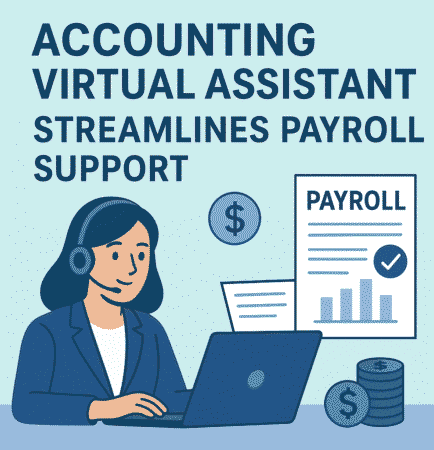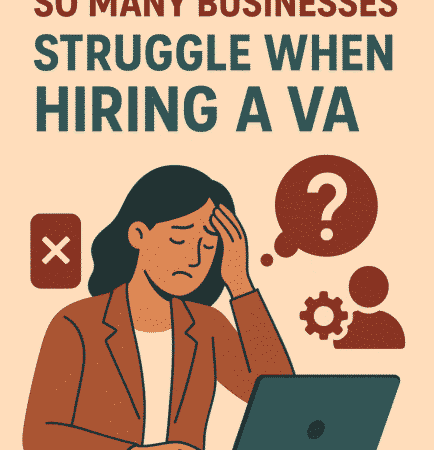

How Virtual Executive Assistants Help CEOs Stay Organized

CEOs constantly juggle responsibilities in today's fast-paced business world, from steering company strategy to managing stakeholder relationships. With so many demands on their time, staying organized can be a significant challenge. Enter the virtual executive assistant - a game-changing solution revolutionizing how top executives manage their workload and boost their productivity.
Virtual assistants, or VAs, have become an indispensable asset for CEOs across industries. These remote professionals provide administrative support, manage schedules, and handle various tasks without a physical office presence. But how exactly do these digital dynamos help keep the C-suite running smoothly? Let's dive into the world of virtual assistance and explore the various ways these modern-day multitaskers are transforming executive organizations.
The Rise of Virtual Assistance
Virtual assistance isn't new, but it's gained significant traction recently. As technology has advanced and remote work has become more mainstream, having a highly skilled assistant working from anywhere worldwide has become feasible and often preferable.
Virtual executive assistants can be human professionals working remotely or AI-powered digital assistants. While AI assistants are becoming increasingly sophisticated, for this article, we'll focus primarily on human virtual assistants, as they currently offer the highest level of comprehensive support for CEOs.
The Benefits of Virtual Executive Assistants
1. Unparalleled Flexibility
One of the most significant advantages of virtual assistants is their flexibility. Unlike traditional in-office administrative assistants, VAs can work outside of standard business hours, adapting to the often unconventional schedules of CEOs. This flexibility ensures executives have support when needed, whether early morning preparation for a board meeting or late-night travel arrangements for an unexpected business trip.
2. Cost-Effective Solution
Hiring a full-time, in-house executive assistant can be a significant expense for a company. Virtual assistants, on the other hand, often work on a contract or part-time basis, which can result in substantial cost savings. CEOs can access high-level support without the overhead costs of a full-time employee, such as office space, equipment, or benefits.
3. Access to a Diverse Skill Set
Virtual executive assistants often come from varied professional backgrounds and possess various skills. This diversity allows CEOs to tap into a broad spectrum of expertise, from social media management to basic graphic design, without hiring multiple specialists.
4. Increased Productivity
CEOs can focus their energy on high-level strategic thinking and decision-making by delegating time-consuming tasks to a virtual assistant. This delegation of administrative duties can significantly boost productivity, allowing executives to make the most of their limited time.
5. Global Talent Pool
When hiring a virtual assistant, CEOs aren't limited by geographical constraints. They can choose from a global talent pool, selecting the best candidate for their needs regardless of location. This global reach often results in finding more qualified and experienced assistants than might be available locally.
Critical Tasks Handled by Virtual Executive Assistants
Virtual assistants can take on various responsibilities, freeing up valuable time for CEOs. Here are some of the crucial tasks that VAs typically handle:
1. Calendar Management
One of the most essential functions of a virtual executive assistant is managing the CEO's calendar. This involves more than just scheduling appointments; it requires a strategic approach to time management. A skilled VA will:
● Prioritise meetings and events based on the CEO's goals and preferences
● Block out time for focused work, strategizing, and personal activities
● Coordinate with other executives and stakeholders to arrange meetings efficiently
● Provide reminders and briefings for upcoming appointments
● Handle scheduling conflicts and make necessary adjustments
By managing the CEO's calendar effectively, virtual assistants ensure that every minute of the executive's day is optimized for productivity and impact.
2. Email Management
CEOs are often inundated with emails, making staying on top of essential communications challenging. Virtual assistants can help by:
● Sorting and prioritizing emails
● Drafting responses for the CEO's approval
● Flagging urgent messages that require immediate attention
● Archiving and organizing emails for easy reference
● Managing spam and unsubscribing from unnecessary newsletters
With a VA handling email management, CEOs can focus on the most critical communications without getting bogged down in their inbox.
3. Travel Arrangements
Business travel can be complex and time-consuming to organize. Virtual executive assistants excel at handling all aspects of travel planning, including:
● Booking flights, hotels, and ground transportation
● Creating detailed itineraries
● Arranging meetings and events at the destination
● Handling visa and passport requirements
● Managing travel expenses and reimbursements
By entrusting travel arrangements to a VA, CEOs can arrive at their destinations stress-free and fully prepared for their business engagements.
4. Research and Information Gathering
Virtual assistants can conduct thorough research on various topics, saving CEOs countless hours. This might include:
● Compiling industry reports and competitive analysis
● Gathering background information on potential clients or partners
● Researching new markets or business opportunities
● Summarising news and trends relevant to the company's interests
With a VA handling research tasks, CEOs can quickly make informed decisions without spending valuable time sifting through information.
5. Document Preparation and Management
Virtual assistants are crucial in document management, from creating presentations to organizing digital files. They can:
● Prepare reports, memos, and presentations
● Format and proofread documents
● Organise and maintain a digital filing system
● Ensure version control for essential documents
● Create and update standard operating procedures
By keeping documents organized and readily accessible, VAs help CEOs maintain a structured and efficient workflow.
6. Social Media and Online Presence Management
Maintaining a solid online presence is crucial for CEOs in today's digital age. Virtual assistants can help by:
● Managing social media accounts
● Drafting and scheduling posts
● Monitoring mentions and engaging with followers
● Updating professional profiles on platforms like LinkedIn
● Assisting with personal branding efforts
With a VA managing their online presence, CEOs can build and maintain their digital reputation without becoming a time sink.
7. Personal Task Management
Virtual executive assistants often handle CEOs' tasks, helping maintain a healthy work-life balance. This might include:
● Managing personal appointments and schedules
● Arranging family events or vacations
● Handling personal shopping or gift-buying
● Organizing home services or repairs
● Managing personal finances and bill payments
By taking care of personal tasks, VAs allow CEOs to focus on their professional responsibilities without neglecting their personal lives.
Implementing a Virtual Assistant Solution
While the benefits of virtual executive assistants are clear, implementing this solution effectively requires careful consideration and planning. Here are some steps CEOs can take to ensure a successful partnership with a virtual assistant:
1. Identify Your Needs
Before hiring a virtual assistant, assessing your specific needs and pain points is crucial. Consider the tasks that consume most of your time and which responsibilities you'd like to delegate. This assessment will help you create a clear job description and find a VA with the proper skill set.
2. Choose the Right VA
Selecting the right virtual assistant is critical to the success of this arrangement. Look for someone with:
● Relevant experience in executive support
● Strong communication skills
● Proficiency in necessary software and tools
● A proactive and problem-solving mindset
● Flexibility and adaptability
Consider working with a reputable virtual assistant agency or platform to find pre-screened, qualified candidates.
3. Establish Clear Communication Channels
Effective communication is critical to a successful relationship with your virtual assistant. Set up regular check-ins and decide on the best methods for daily communication, whether email, instant messaging, video calls, or a combination of these.
4. Implement Secure Systems
When working with a remote assistant, it's essential to have secure systems in place for sharing sensitive information. Use encrypted communication tools, secure file-sharing platforms, and password managers to protect confidential data.
5. Start with a Trial Period
Consider starting with a short trial period to ensure that the working relationship is a good fit. This allows you and the VA to assess the arrangement and make any necessary adjustments before committing to the long-term.
6. Provide Thorough Onboarding
Invest time in properly onboarding your virtual assistant. Share your preferences, goals, and expectations. Provide access to necessary tools and information, and be patient as your VA learns the nuances of your work style.
7. Delegate Gradually
Start by delegating smaller tasks and gradually increasing the VA's responsibilities as trust and efficiency grow. This approach allows for a smooth transition and helps build a strong working relationship.
8. Utilize Technology
Take advantage of project management tools, time-tracking software, and collaboration platforms to streamline your work with your virtual assistant. These tools can enhance productivity and ensure seamless coordination.
Overcoming Challenges
While virtual executive assistants offer numerous benefits, there can be challenges to overcome:
1. Time Zone Differences
If your VA is in a different time zone, finding overlapping working hours may require adjustment. Clear communication about availability and expectations can help mitigate this issue.
2. Building Trust Remotely
Developing trust with someone you've never met in person can take time. Regular video calls and consistent communication can help build a strong working relationship.
3. Maintaining Confidentiality
When sharing sensitive information with a remote assistant, ensure you have robust security measures and clear confidentiality agreements.
4. Overcoming Technology Issues
Reliance on technology means that technical issues can sometimes disrupt work. Having backup plans and alternative communication methods can minimise disruptions.
The Future of Executive Assistance
As technology advances, the role of virtual executive assistants is likely to evolve. We're already seeing the integration of AI-powered tools to enhance human VA capabilities, and this trend is expected to continue.
Future virtual assistants may leverage advanced AI to provide even more comprehensive support, from predictive scheduling to data-driven decision-making assistance. However, the human touch will remain invaluable, especially for tasks requiring emotional intelligence, creativity, and complex problem-solving.
Conclusion
In an era where time is the most precious commodity for CEOs, virtual executive assistants have emerged as a powerful solution for staying organized and productive. By handling a wide range of administrative tasks, conducting research, managing communications, and even taking care of personal errands, these remote professionals allow executives to focus on what truly matters: leading their companies to success.
The flexibility, cost-effectiveness, and access to diverse skill sets that virtual assistants offer make them attractive for CEOs looking to optimize their time and enhance productivity. As the business world continues to evolve, embracing the support of a virtual executive assistant may become the norm rather than the exception for forward-thinking leaders.
CEOs can unlock new efficiency and organization by selecting the right virtual assistant, establishing clear communication channels, and gradually building a trusting working relationship. In doing so, they improve their productivity and set a powerful example of effective delegation and modern leadership for their entire organization.
The rise of virtual executive assistants is more than just a trend; it reflects the changing nature of work in the digital age. For CEOs willing to embrace this change, the rewards can be substantial: more time for strategic thinking, improved work-life balance, and the ability to lead with greater focus and effectiveness. In the fast-paced world of business leadership, having a skilled virtual assistant by your side is the key to staying ahead of the curve and achieving long-term success.


